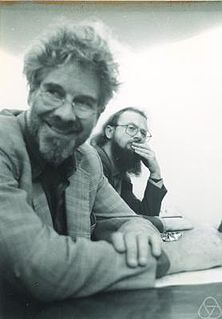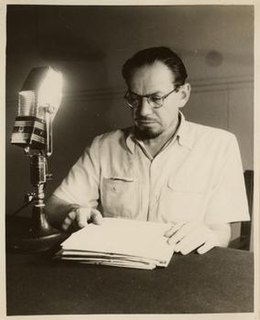A Quote by Elbert Hubbard
No man should dogmatize except on the subject of theology. Here he can take his stand, and by throwing the burden of proof on the opposition, he is invincible. We have to die to find out whether he is right.
Related Quotes
An opposition is necessary and desirable for the healthy development of any country. You can scarcely find anyone in opposition, except for the communists, just like in Yeltsin's times. It is regrettable that there is still no constructive, clear and large-scale opposition in Russia. The growth and development of an opposition, as well as the maturing of other democratic institutions, will take more time and experience.
When I have a difficult subject before me - when I find the road narrow, and can see no other way of teaching a well established truth except by pleasing one intelligent man and displeasing ten thousand fools - I prefer to address myself to the one man, and to take no notice whatever of the condemnation of the multitude; I prefer to extricate that intelligent man from his embarrassment and show him the cause of his perplexity, so that he may attain perfection and be at peace.
Theology is not a private subject for theologians only. Nor is it a private subject for professors. Fortunately, there have always been pastors who have understood more about theology than most professors. Nor is theology a private subject of study for pastors. Fortunately, there have repeatedly been congregation members, and often whole congregations, who have pursued theology energetically while their pastors were theological infants or barbarians. Theology is a matter for the Church.
A man's reputation is not in his own keeping, but lies at the mercy of the profligacy of others. Calumny requires no proof. The throwing out [of] malicious imputations against any character leaves a stain, which no after-refutation can wipe out. To create an unfavorable impression, it is not necessary that certain things should be true, but that they have been said. The imagination is of so delicate a texture that even words wound it.
My conclusion is that there is no reason to believe any of the dogmas of traditional theology and, further, that there is no reason to wish that they were true. Man, in so far as he is not subject to natural forces, is free to work out his own destiny. The responsibility is his, and so is the opportunity.
I am obliged to interpolate some remarks on a very difficult subject: proof and its importance in mathematics. All physicists, and a good many quite respectable mathematicians, are contemptuous about proof. I have heard Professor Eddington, for example, maintain that proof, as pure mathematicians understand it, is really quite uninteresting and unimportant, and that no one who is really certain that he has found something good should waste his time looking for proof.
[I]f a man bred to the seafaring life, and accustomed to think and talk only of matters relating to navigation, enters into discourse upon any other subject; it is well known, that the language and the notions proper to his own profession are infused into every subject, and all things are measured by the rules of navigation: and if he should take it into his head to philosophize concerning the faculties of the mind, it cannot be doubted, but he would draw his notions from the fabric of the ship, and would find in the mind, sails, masts, rudder, and compass.
Theology is a non-subject. I'm not saying that professors of theology are non-professors. They do interesting things, like study biblical history, biblical literature. But theology, the study of gods, the study of what gods do, presupposes that gods exist. The only kind of theology that I take account of are those theological arguments that actually argue for the existence of God.
The scientist has to take 95 per cent of his subject on trust. He has to because he can't possibly do all the experiments, therefore he has to take on trust the experiments all his colleagues and predecessors have done. Whereas a mathematician doesn't have to take anything on trust. Any theorem that's proved, he doesn't believe it, really, until he goes through the proof himself, and therefore he knows his whole subject from scratch. He's absolutely 100 per cent certain of it. And that gives him an extraordinary conviction of certainty, and an arrogance that scientists don't have.
When a plane crashes and some die while others live, a skeptic calls into question God's moral character, saying that he has chosen some to live and others to die on a whim; yet you say it is your moral right to choose whether the child within you should live or die. Does that not sound odd to you? When God decides who should live or die, he is immoral. When you decide who should live or die, it's your moral right.






































